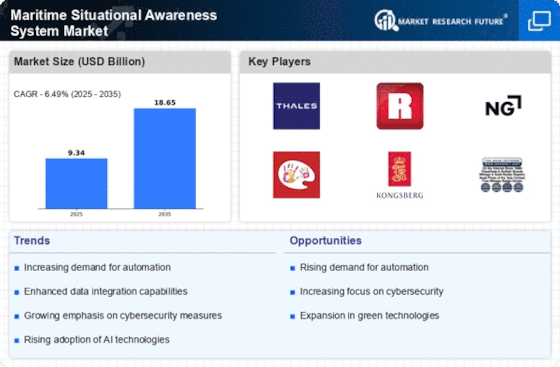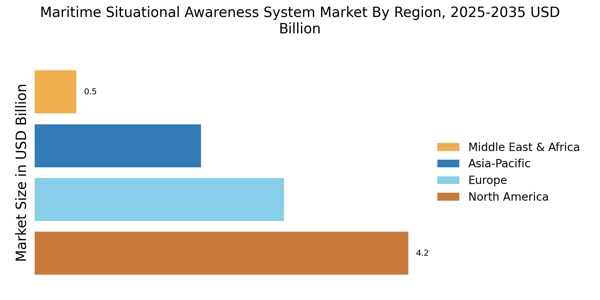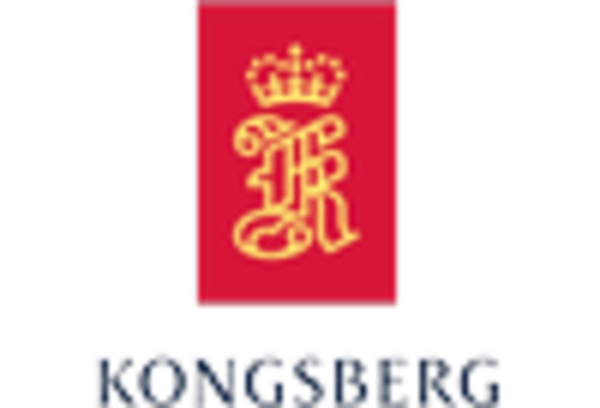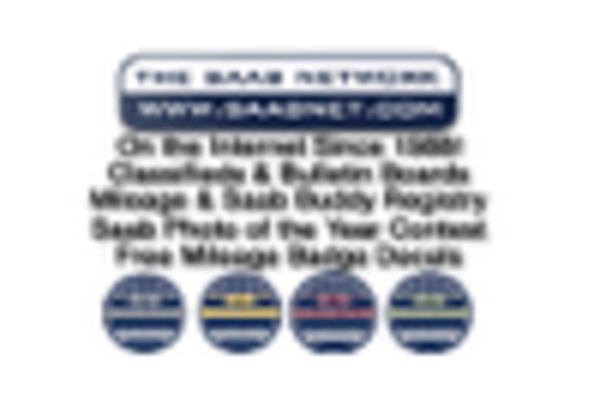Technological Advancements
The Maritime Situational Awareness System Market is experiencing a surge in demand due to rapid technological advancements. Innovations in sensor technology, data analytics, and artificial intelligence are enhancing the capabilities of maritime situational awareness systems. These systems are increasingly integrated with satellite communications and real-time data processing, allowing for improved decision-making and operational efficiency. According to recent estimates, the market is projected to grow at a compound annual growth rate of approximately 10% over the next five years. This growth is driven by the need for enhanced safety and security in maritime operations, as well as the increasing complexity of maritime environments. As technology continues to evolve, the Maritime Situational Awareness System Market is likely to see further enhancements in system capabilities, making it a critical component for maritime stakeholders.
Emerging Geopolitical Tensions
The Maritime Situational Awareness System Market is increasingly affected by emerging geopolitical tensions. As nations assert their maritime claims and engage in territorial disputes, the need for enhanced situational awareness becomes paramount. Countries are investing in advanced maritime surveillance systems to monitor their waters and respond to potential threats. This trend is particularly pronounced in regions with strategic maritime routes, where the stakes are high. The market is expected to grow as nations prioritize national security and maritime sovereignty. Analysts predict that defense spending in maritime capabilities will increase, further bolstering the demand for situational awareness systems. Thus, the Maritime Situational Awareness System Market is likely to benefit from the heightened focus on geopolitical stability and maritime security.
Regulatory Pressures and Compliance
The Maritime Situational Awareness System Market is also shaped by regulatory pressures and compliance requirements. Governments and international organizations are implementing stringent regulations aimed at improving maritime safety and environmental protection. These regulations necessitate the adoption of advanced situational awareness systems to ensure compliance and enhance operational efficiency. For instance, the International Maritime Organization has established guidelines that require vessels to implement systems capable of real-time monitoring and reporting. As a result, the demand for maritime situational awareness systems is expected to rise, as companies strive to meet these regulatory standards. The market is projected to grow as stakeholders recognize the importance of compliance in maintaining operational licenses and avoiding penalties. This trend underscores the critical role of the Maritime Situational Awareness System Market in facilitating adherence to evolving regulations.
Increased Maritime Security Concerns
The Maritime Situational Awareness System Market is significantly influenced by rising maritime security concerns. With the increase in piracy, smuggling, and illegal fishing activities, there is a pressing need for robust situational awareness systems to monitor and respond to threats. Governments and private entities are investing heavily in advanced surveillance and monitoring technologies to safeguard their maritime interests. The market is expected to witness a substantial increase in demand for these systems, as stakeholders seek to enhance their security measures. Recent reports indicate that the maritime security market is anticipated to reach USD 30 billion by 2026, reflecting the urgency of addressing security challenges. Consequently, the Maritime Situational Awareness System Market is poised for growth as it provides essential tools for threat detection and response.
Growing Demand for Efficient Resource Management
The Maritime Situational Awareness System Market is witnessing a growing demand for efficient resource management solutions. As maritime operations become increasingly complex, stakeholders are seeking systems that can optimize resource allocation and enhance operational efficiency. Advanced situational awareness systems provide real-time data on vessel movements, environmental conditions, and resource availability, enabling better decision-making. This trend is particularly evident in the shipping and logistics sectors, where companies are striving to reduce operational costs and improve service delivery. Recent analyses suggest that the maritime logistics market is expected to grow significantly, further driving the need for effective situational awareness systems. Consequently, the Maritime Situational Awareness System Market is likely to expand as organizations prioritize resource optimization and operational excellence.

















